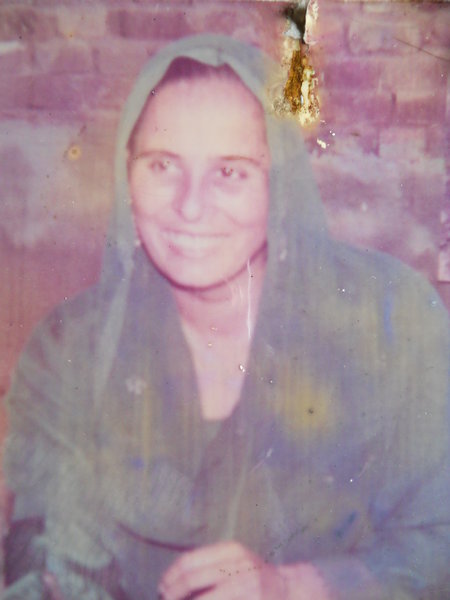ਹਰਜੀਤ ਕੌਰ
ਗ਼ੈਰ ਕਾਨੂੰਨੀ ਹੱਤਿਆ ਦੀ ਤਾਰੀਖ਼ ਜੁਲਾਈ ੨੦, ੧੯੯੨
ਇਸਤਰੀ, ਉਮਰ ੩੦-੩੧
ਜਨ ਅੰਕੜਾ ਅਧਿਐਨ
ਪੜ੍ਹਾਈ
ਮਿਡਲ ਸਕੂਲ
ਕਿੱਤਾ/ਨੌਕਰੀ
ਘਰੇਲੂ ਔਰਤ
ਵਿਆਹਿਆ/ਵਿਆਹੀ
ਹਾਂ ਜੀ
ਬੱਚੇ
੨
ਧਰਮ
ਸਿੱਖ, ਅੰਮ੍ਰਿਤਧਾਰੀ
ਜਾਤ
ਜੱਟ

ਹਿਰਾਸਤ ਅਤੇ ਤਸ਼ੱਦਦ
ਪੁਰਾਣੀਆਂ ਗ੍ਰਿਫ਼ਤਾਰੀਆਂ
ਹਾਂ ਜੀ, ੬-੭
ਪੁਰਾਣੇ ਤਸ਼ੱਦਦ
ਹਾਂ ਜੀ
ਪਰਿਵਾਰ ਦੀ ਸਮਝ ਮੁਤਾਬਕ ਪੀੜਤ ਨੂੰ ਕਿਉਂ ਨਿਸ਼ਾਨਾ ਬਣਾਇਆ ਗਿਆ
ਪੀੜਤ ਦਾ ਰਿਸ਼ਤੇਦਾਰ ਖਾੜਕੂ ਸੀ; ਪੀੜਤ ਖਾੜਕੂਆਂ ਦੀ ਸਹਾਇਤਾ ਕਰਦਾ ਸੀ
ਸਰੀਰ ਨਾਲ ਕੀ ਕੀਤਾ
ਸਰੀਰ ਵਾਪਸ ਮੋੜ ਦਿੱਤਾ
ਨਹੀਂ ਜੀ
ਸੁਰੱਖਿਆ ਬਲਾਂ ਨੇ ਸਰੀਰ ਵਾਪਸ ਮੋੜ ਦਿੱਤਾ
ਸਰੀਰ ਦਾ ਸਸਕਾਰ ਕਰ ਦਿੱਤਾ ਗਿਆ
ਭੋਗ ਦੀ ਖਬਰ
ਨਹੀਂ ਜੀ
ਸੁਰੱਖਿਅਕ ਦਸਤੇ ਜੋ ਕਾਰਵਾਈ ਵਿੱਚ ਸ਼ਾਮਲ ਸਨ
ਸੁਰੱਖਿਅਕ ਦਸਤੇ ਜੋ ਗ਼ੈਰ ਕਾਨੂੰਨੀ ਹੱਤਿਆ ਵਿੱਚ ਸ਼ਾਮਲ ਸਨ
ਖਾੜਕੂ ਲਹਿਰ ਨਾਲ ਸੰਬੰਧਿਤ
ਖਾੜਕੂ
ਨਹੀਂ ਜੀ
ਖਾੜਕੂਆਂ ਦੀ ਸਹਾਇਤਾ ਕੀਤੀ
ਹਾਂ ਜੀ, ਆਪਣੀ ਮਰਜ਼ੀ ਨਾਲ
ਹੀਲਾ ਅਤੇ ਅਸਰ
ਸੁਰੱਖਿਅਕ ਦਸਤੇ ਜਿਨ੍ਹਾਂ ਤਕ ਪਹੁੰਚ ਕੀਤੀ
ਨਹੀਂ ਜੀ
ਕੋਈ ਕਾਨੂੰਨੀ ਪੈਰਵੀ ਕੀਤੀ
ਨਹੀਂ ਜੀ, ਬਦਲੇ ਤੋਂ ਡਰ (ਜਿਵੇਂ ਕਿ: ਝੂਠੇ ਕੇਸ, ਤਸ਼ੱਦਦ, ਹਿਰਾਸਤ ਆਦਿ)
ਪਰਿਵਾਰ ਉੱਪਰ ਅਸਰ
ਪਰਿਵਾਰ ਦੇ ਸਦੱਸ ਦੀ ਪੜ੍ਹਾਈ ਛੁੱਟ ਗਈ, ਪਰਿਵਾਰ ਨੇ ਘਰ ਛੱਡ ਦਿੱਤਾ
ਸਰਕਾਰ ਤੋਂ ਕੀ ਮੰਗ
ਕਿੱਤਾ/ਨੌਕਰੀ; ਸੱਚ ਸਾਮ੍ਹਣੇ ਲਿਆਉਣ ਲਈ ਕਮਿਸ਼ਨ ਬਣਾਇਆ ਜਾਵੇੇ; ਸਰਕਾਰੀ ਧੱਕੇਸ਼ਾਹੀ ਦੀ ਪੁੱਛ ਪੜਤਾਲ ਕੀਤੀ ਜਾਵੇ; End to ongoing police harassment
ਸੰਬੰਧਿਤ ਪੀੜਤ
ਪਰਿਵਾਰ ਵਿੱਚ ਲਾਪਤਾ ਜਾਂ ਫਿਰ ਗੈਰ ਕਾਨੂੰਨੀ ਹੱਤਿਆ ਨਾਲ ਸੰਬੰਧਿਤ ਹਾਦਸੇ
੨
ਪਰਿਵਾਰ ਵਿੱਚ ਅਸਲ ਮੁਕਾਬਲੇ
ਨਹੀਂ ਜੀ
ਹੋਰਾਂ ਦੀ ਨਾਲ ਗੈਰ ਕਾਨੂੰਨੀ ਹੱਤਿਆ ਕੀਤੀ
ਹਾਂ ਜੀ, ੧
ਪਰਿਵਾਰ ਦੇ ਵਿਚਾਰ
ਸੰਖੇਪ ਵਰਨਣ/ਸਾਰੰਸ਼
Harjit Kaur was a Jat, Amritdhari Sikh, and a resident of village Bassian in Ludhiana. She was 30-31 years old when Indian security forces killed her and her husband. She had studied until middle school and worked as a housewife. She had two children. She was not a combatant; she had voluntarily provided support to the militancy.
Punjab Police detained and tortured Harjit Kaur six to seven times prior to her killing. When Harjit Kaur married her husband, he was a militant. Security forces had repeatedly detained and tortured him several times, as well as his father and other relatives. Harjit Kaur's in-laws believe she was targeted because she was related to a militant, and gave support to a militant. Prior to her killing, Punjab Police had also released all of their cattle, and prevented the family from farming, forcing them to abandon their home.
On July 20, 1992, Harjit Kaur, her husband, and their two children were traveling from Ambala to Chandigarh. At village Lalru, Punjab Police killed Harjit Kaur and her husband. Their two young children, ages three-and-a-half years and two-and-a-half years, survived and were taken by a bystander to a familiar candy shop. From there, individuals asked around, and the children were returned to their grandparents after 16 days. Harjit Kaur's family learned the police had cremated the bodies of Harjit Kaur and her husband, so they went to Lalru police station and retrieved the ashes and photographs of the dead bodies.
Harjit Kaur's family did not pursue any legal advocacy; nor did they approach a human rights commission. They also did not publish a bhog notice. They were afraid of retaliation, and faced repeated detention and torture from the police, as well as harassment that prohibited the survivors from living at their house and farming. Family members also dropped out of school as a result of Harjit Kaur's unlawful killing. Survivors believe the government should establish a truth commission, provide employment to survivors, investigate the abuses, and end ongoing harassment.
ਧਿਆਨ ਦਿਓ: ਜ਼ਿਲ੍ਹੇ ਅਤੇ ਤਹਿਸੀਲ ਦੀਆਂ ਸੀਮਾਂ ੨੦੦੧ ਦੀ ਮਰਦਮਸ਼ੁਮਾਰੀ ਤੇ ਅਧਾਰਤ ਹੈ। ਸਾਡੇ ਵਿਧੀ ਗਿਆਨ ਵਾਸਤੇ ਅੱਗੇ ਪੜ੍ਹੋ।


